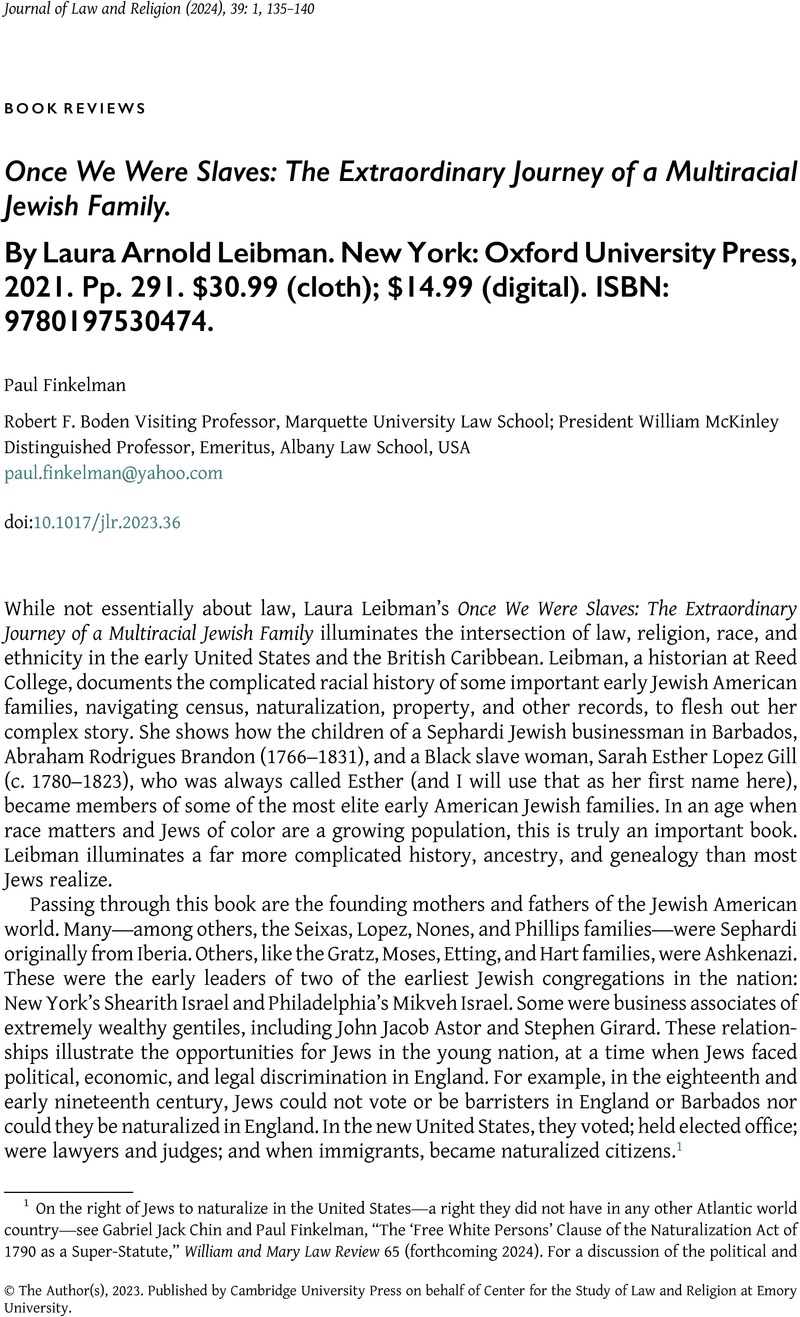No CrossRef data available.
Article contents
Once We Were Slaves: The Extraordinary Journey of a Multiracial Jewish Family. By Laura Arnold Leibman. New York: Oxford University Press, 2021. Pp. 291. $30.99 (cloth); $14.99 (digital). ISBN: 9780197530474.
Review products
Published online by Cambridge University Press: 28 November 2023
Abstract

- Type
- Book Review
- Information
- Copyright
- © The Author(s), 2023. Published by Cambridge University Press on behalf of Center for the Study of Law and Religion at Emory University
References
1 On the right of Jews to naturalize in the United States—a right they did not have in any other Atlantic world country—see Chin, Gabriel Jack and Finkelman, Paul, “The ‘Free White Persons’ Clause of the Naturalization Act of 1790 as a Super-Statute,” William and Mary Law Review 65 (forthcoming 2024)Google Scholar. For a discussion of the political and economic rights of Jews in the early United States, see Finkelman, Paul and Sussman, Lance J., “The Emergence of Jewish Legal and Political Equality in the New American Nation,” American Jewish Archives Journal 75 (forthcoming 2023)Google Scholar.
2 This would be worth close to a million dollars today, but on a calculation of buying power, it would be more. It was, however calculated, an impressive fortune.
3 McConnell, Michael W., “The Supreme Court’s Earliest Church-State Cases: Windows on Religious-Cultural-Political Conflict in the Early Republic,” Tulsa Law Review 37, no. 1 (2001): 7–43, at 20Google Scholar; Vidal v. Girard’s Executors, 43 U.S. (2 How.) 127 (1844). For a history of Vidal, see McConnell, “The Supreme Court’s Earliest Church-State Cases,” 20–30.
4 Gershom Seixas is often incorrectly called a rabbi, but he was not ordained and never described himself as such. He was known as Rev. Seixas at the time, especially within the Christian community, and was the spiritual leader of his congregation. His official role at Shearith Israel was as the Hazzan, or cantor, for the synagogue, who led all worship services. There were no ordained rabbis in the United States at this time. It is also worth noting that he was an invited spiritual leader at George Washington’s inauguration and was a trustee of King’s College when it was renamed Columbia College (now University). At this time, Jews could not even attend universities in Great Britain.
5 Naturalization Act of 1790, Act of Mar. 26, 1790, 1 Stat. 103.
6 Brandon later had six children with a white Christian woman who raised the children Jewish. He never married her, either.
7 She does not show up in the 1820 census for New York, perhaps suggesting that Abraham Brandon understood the importance of hiding her from careful scrutiny.
8 Naturalization Act of 1790, Act of Mar. 26, 1790, 1 Stat. 103. For a history of this clause, see Chin and Finkelman, “The ‘Free White Persons’ Clause of the Naturalization Act of 1790 as a Super Statute.”
9 Soundex Index to Petitions for Naturalization Filed in Federal, State, and Local Courts Located in New York City, 1792–1989, New York, National Archives at New York City, accessed August 2, 2023, https://www.ancestry.com.
10 See for example, Jones, Bernie D., Fathers of Conscience: Mixed Race Inheritance in the Antebellum South (Athens: University of Georgia Press, 2009)Google Scholar.
11 Ball, Edward, Slaves in the Family (New York: Farrar, Straus, and Giroux, 1998)Google Scholar.
12 Davis, Sammy, Jr., Boyar, Jane, and Boyar, Burt, Yes I Can: The Story of Sammy Davis, Jr. (New York: Farrar, Straus, and Giroux, 1965)Google Scholar. The other Jew in the Rat Pack was Joseph Abraham Gottlieb, who had adopted the very Christian stage name of Joey Bishop.





